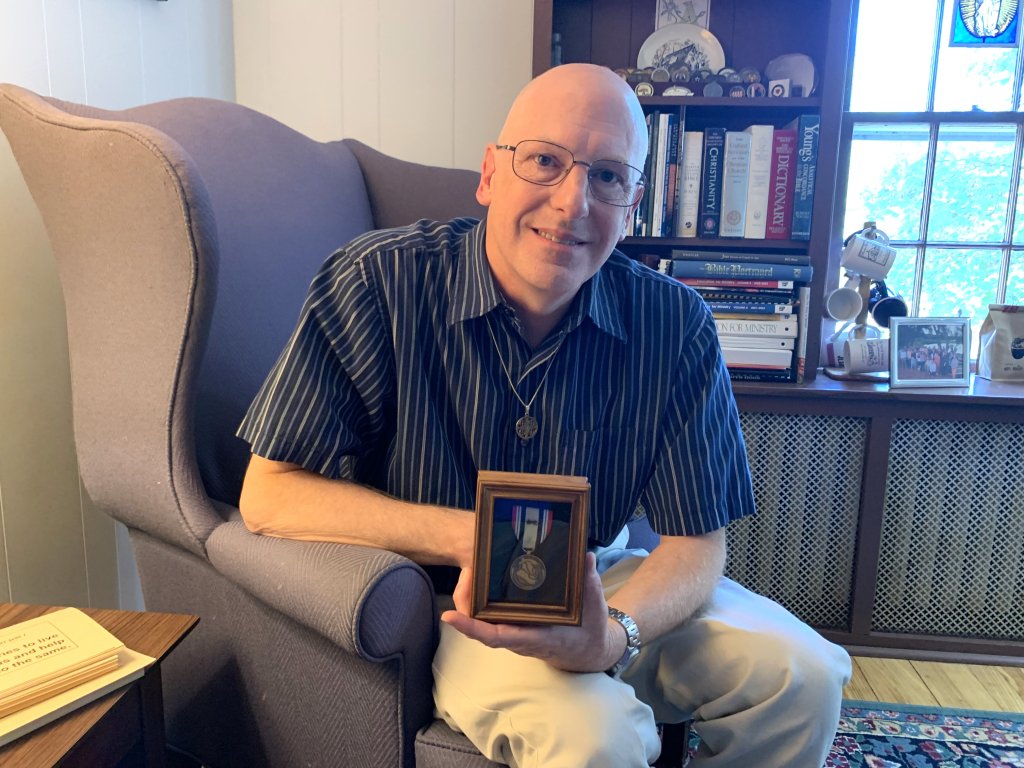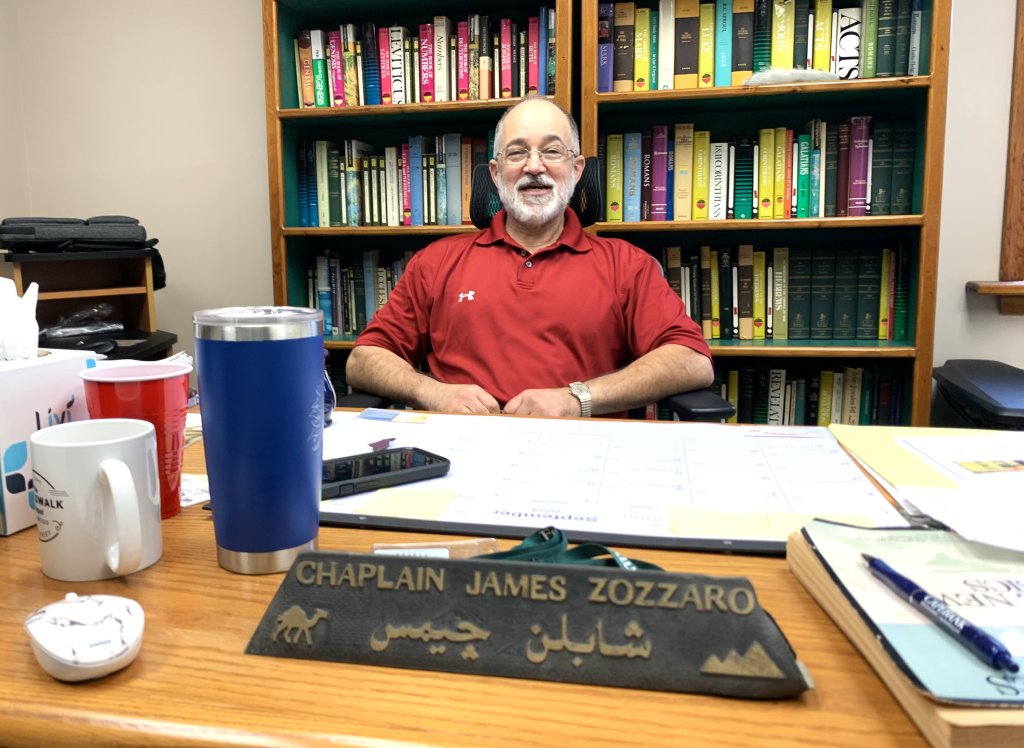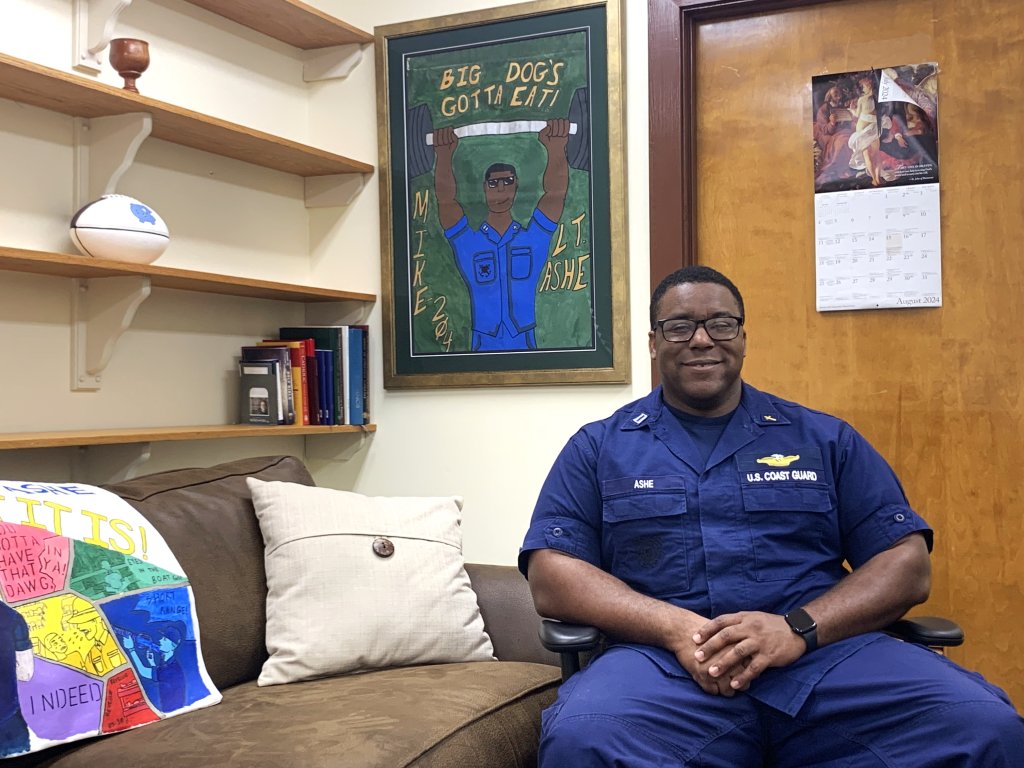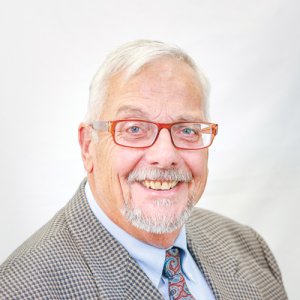On Feb. 3, 1943, the U.S. Army Transport Dorchester was torpedoed off the coast of Greenland by German U-boats. There were four Army chaplains on the ship: Lt. George Fox, a Methodist; Lt. Alexander Goode, a Jewish rabbi; Lt. John Washington, a Roman Catholic priest; and Lt. Clark Poling, a Dutch Reformed minister. With the lights out due to the attack, the four chaplains went to work guiding the soldiers out of the blackened bowels of the ship and helping them get to lifejackets. As the lifejackets ran out, the chaplains removed their own lifejackets and handed them to frightened soldiers. The four chaplains, later known as the “Immortal Chaplains,” perished among 675 soldiers who either drowned or died of hypothermia.
The Herald had the opportunity to speak to several present or former chaplains who have or might serve in combat environments.
Father Alan Leonard

One of the first was Fr. Alan Leonard, who for the past five years has been the rector of the Episcopal Church of the Advent in Cape May. Born in DeKalb, Illinois, he joined ROTC in college. Upon graduation, he was commissioned as a second lieutenant in the U.S. Army Field Artillery and was stationed at Fort Sill, Oklahoma. He was later assigned to a unit in Germany and, after four years in the Army, was discharged at Fort Dix.
While attending seminary, Leonard was on Individual Ready Reserve, where, for a time, one who has left active duty can be called back to service. Two years after becoming an ordained Episcopal priest, Leonard rejoined the Army as a chaplain. His first permanent (in military terms) assignment was Fort Lewis, Washington, and after three years, he was sent to the 501st Forward Support Battalion of the 1st Brigade’s 1st Armored Division in Friedberg, Germany.
Leonard said, whether in Germany or stateside, the chaplain’s ministry is roughly the same.
“Lots of conversations with young soldiers,” Leonard said.
Leonard used a term often used in chaplaincy – “incarnational ministry” – which is simply being present. This can mean doing morning physical training with different companies or walking around the motor pool talking to whomever you meet. Often, while doing so, he would hear, “Hey, chaplain, can we talk?”
The talks can take on a deeper meaning simply by being stationed overseas, and there is another level of conversational vulnerability that happens when they are going to see deployment. Leonard said when his unit was deployed from Germany to Iraq soldiers showed signs of significant stress before deployment. The 501st provided forward support to combat unit and the majority of soldiers reacted with a gung-ho attitude.
“It was like, ‘I get to go to combat – hoooah!’” Leonard said.
A minority, he said, remained silent, which suggested they were internalizing their concerns and fears. A smaller minority was actively trying to get out of the military.
“By the time to get to Iraq, now things are real now they are nervous,” Leonard said.
Leonard said the 501st ended up stationed in a “little spot in downtown Bagdad.” The unit spent 12 months there, and then another three months at the airport before being redeployed back to Germany. In that time, Leponard ministered to many wounded troops, but the unit had just one fatality, which was from “friendly fire.” A lieutenant was careless with his M-16 rifle, which went off inside a vehicle and killed a young soldier.
Rev. Chaplain Ed Yurus, U.S. Army Retired
Ed Yurus recently visited Christ Church in North Cape May. Yurus is a former Army chaplain, having retired as a colonel. Born in Yonkers, New York, he was raised in Pleasantville, New York, and attended Knox Theological Seminary and was later ordained in the Presbyterian Church in America. He became a chaplain at age 36, which is on the older side, entering the Army upon graduation from seminary. He spent the next 23 years as a chaplain, retiring in 2022. After serving for a time on the operational side of chaplaincy, he was offered the chance to become a counselor, family life chaplain, or hospital chaplain. Instead, he attended the Command and General Staff College at Fort Leavenworth, Kansas.
“I chose to stay with the fighting force rather than the other opportunities; to stay with troops preparing to go to combat, were already in combat, or got out of combat,” Yurus said.
Yurus said he spent a lot of time under 18th Airborne Corps and Special Operations. Out of 23 years, he said, he spent 90 to 95 months separated from his family, with about 41 months in a combat environment in Iraq and Afghanistan. One of his most unique assignments was between 2005 and 2006, when he was chaplain to the Guantanamo Bay Detention Center, which housed suspected terrorists.
“It was a very challenging situation for leadership at Guantanamo. It was like building an airplane midflight,” Yurus said.
Yurus said the assignment was challenging for corrections officers, who were understaffed and overworked.
“I was given great freedom to spend time with corrections officers to do moral leadership training,” he said.
Yurus that in his time spent as a military chaplain, he observed that chaplains were generally appreciated by those he served, particularly in combat environments.
Rev. James Zozzaro

Rev. James Zozzaro was ordained by the Orthodox Presbyterian Church, and is currently the pastor of Christ the King Church in North Wildwood and the director of the Boardwalk Chapel in Wildwood. Zozzaro, who had something of a lifelong dream to service in the military, received his commission in the NJ Army National Guard in 2000, and on Sept. 11, 2001, he had not yet become job qualified when he was called into duty for the attacks that we now know as “9-11.”
Assigned to the National Guard’s 1/114 Infantry Battalion-Mechanized, Zozzaro and his chaplain’s assistant, Ed Afanador, were assigned to work at the site of the World Trade Center attack in Manhattan and the area. Named Operation Noble Eagle, this was part of America’s war on terror. Zozzaro said that as a chaplain serving soldiers and first responders after 9-11, he and his assistant tried to be of any kind of service – visiting those working at bridges or tunnels leading into the city, bringing coffee, religious tracts or bibles, and simply talking to people – or more to the point, listening to them.
Zozzaro said they would minister at “ground zero” to firefighters and other workers. Staying at the Jersey City Armory, they would visit families who gathered at Liberty State Park, waiting for news of loved ones. He said they were homeported at Staten Island, the staging ground for all volunteers, and notably, the Fresh Kills Landfill, where truckloads of debris were sifted through to look for “
“In the beginning, they thought they might find live bodies and they brought in rescue dogs, and would pull through the rubble gently. After a week they said let’s scoop up the debris into dump trucks and go through rubble,” Zozzaro said.
Over the next 10 years, Zozzaro would also be assigned to a mobile operating base in Egypt. As a base, Zozzaro had a lot of time to encourage troops in a rear position, helping them by preaching, teaching, or simply providing an alternative to destructive behavior.
“There was just the ministry of presence. When deployed, you live with your congregation, eating every meal with them. And during deployment you can fall apart or fall into everything,” he said.
Zozzaro said some guys would come to him for bible study, or for those who were missing their wives, they saw him as a safe place to be.
“Sometimes we would just watch movies together, just to not be with other guys doing self-destructive things,” he said.
Chaplains have to be available to assist other faiths to participate in religious services, so Zozzaro provided transportation for U.S. soldiers of the Jewish faith to go to Jerusalem for Yom Kippur and Rosh Hashanah.
He also found himself in Italy as the 173rd Airborne was deploying to the Middle East and had the opportunity to be there for family members being left behind.
Zozzaro left the Army National Guard as a captain, opting to be available to his family and church congregation.
Lt. Johnny Ashe, U.S. Navy

Johnny Ashe is from Henderson, North Carolina, and as all Coast Guard chaplains, he is a member of the U.S. Navy. He is assigned to Coast Guard Training Center-Cape May, where he has been since June 2022. Ashe is holding down the position of Command Chaplain until January 2025, when a permanent assignment is made.
Ashe worked with veterans through the Veterans Administration medical centers prior to active duty. He earned a master’s degree from Campbell University and attended the University of North Carolina, Chapel Hill, where he played one season of Division I football. He had intended to be a strength and conditioning coach, but said that “God had other plans.”
Ashe was ordained and endorsed by the National Baptist Convention, USA. He is now responsible for teaching and counseling some 400 recruits who are at the training center at any given time. As the chaplain, Ashe is dealing with a lot of homesick recruits, who perhaps do not miss home as much as they worry about those they left behind. For some, that means dealing with the stresses of growing up and stepping out on their own as they prepare for the “new normal” of military life.
Ashe said he served for a time with the 2nd Marines, accompanying them on mountain warfare training in California, and during a deployment to Norway for cold weather training.
Ashe said he also struggles with many of the issues his recruits face, being away from familiar surroundings, raising a family, and not taking stresses home with him.
Ashe said he can see where his work is making an impact on the recruits he deals with.
“At graduations, I have recruits’ family members who come up to me and say, ‘You’re Chaplain Ashe?’” he said, expressing that they him how their son or daughter spoke highly of him.
Recruit companies sometimes dress up a laundry bag, decorated to express their thanks to him.
Lt. Timothy West, U.S. Navy
Tim West is another chaplain who on active duty who joined later in life. West, a former active-duty Marine, joined the Navy understanding that it provides chaplains for the Marine Corps, too. His first assignment is to the 3rd Recruit Training Battalion at the U.S. Marines Recruit Depot at Paris Island, where is was responsible for some 3,000 recruits.
Originally from Springfield, Ohio, West was the pastor of the Seashore Community Church of the Nazarene. He was ordained by his denomination in 2012 but spent roughly 18 years in pastoral ministry before entering active duty in April 2023. That coupled with serving as a Marine for almost a decade has helped prepare him for serving as a chaplain to young recruits.
West said he spends a lot of his time listening, counseling, and building resiliency in young recruits. West said once the recruits become Marines, they can elect to be baptized.
“I get to preach, get to share the good news, and we did 87 baptisms this year,” he said.
“In a church setting, I did not go to work with the builder, the landscaper, the baker, etc. Here I rub shoulders with those I minister to. I’m up at 4 a.m. hiking with them, praying with them, and in that aspect is more family-oriented than just Bible studies,” he said.
West said he has an excellent support system in the military.
“The Navy assigns us supervisors. If we have a question we can call,” he said.
One of the biggest challenges West faces is remaining relevant in today’s culture.
“While I don’t believe in a lot of their lifestyles, I love them and try to be engaged, whether it’s with recruits or drill instructors,” he said. “We use the truth and I believe it alleviates hopelessness.”
“A lot of kids come out of very difficult situations. We tell them they have options,” West said.
Contact the reporter, Christopher South, at csouth@cmcherald.com or call 609-886-8600 x-128



 UPDATE: Ex-Van Drew Staffer Charged in Elaborate Assault Hoax – New Info Added
UPDATE: Ex-Van Drew Staffer Charged in Elaborate Assault Hoax – New Info Added
 Lower Police Chief Honored as Career Winds Down
Lower Police Chief Honored as Career Winds Down
 Coast Guard Looks to Create Second Recruit Training Center
Coast Guard Looks to Create Second Recruit Training Center





